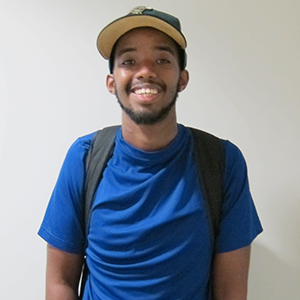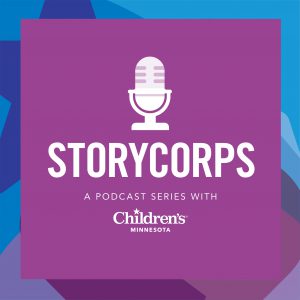Hemophilia: Ahmed’s story


About this episode
Ahmed, a 20 year old with severe factor VIII deficiency or hemophilia A, shares his experiences growing up with hemophilia. Here he shares his experiences growing up with one of the pediatric nurse practitioners, Jocelyn Bessette Gorlin. In the conversation, Ahmed highlights the importance of learning self infusion and attending camp.
Topics:
- Family history
- Diagnosis with family history
- Camp
- Learning self-infusion
- Importance of exercise
Transcript
Ahmed: The thing is: from what my mom told me from what I can remember, I haven’t had any spontaneous bleeding, spontaneous injuries that I can recall at all. I wasn’t a very active kid. I was chubby. I just liked to sit a lot and stay with my mom. I was very attached with my mom, so I guess that played a big role as to why I haven’t had any joint bleeds or any injuries whatsoever, because I was so little, small, inactive, and with my mom a lot.
Jocelyn (pediatric nurse practitioner): How did Mom know that you had hemophilia, your brother had it? Was that why they knew? Or what happened?
Ahmed: I remember that Leban was not tested right when he was born, because he was my mom’s first child. When he was born, I believe he had, like, some sort of a bleed, and then after she went back to the doctor and checked, he got a blood test and found out that he had hemophilia so then since then, from every single kid from there on out, we were just tested, and then they found out myself, my younger brother, Bashir, we were tested and we were all positive for hemophilia so..
Jocelyn: And you have factor VIII..
Ahmed: We take factor VIII. We have severe hemophilia A, so we are type A hemophilia.
Jocelyn: Do you remember ever having a bleed?
Ahmed: I don’t remember the injury happening, but I do remember being hospitalized at night and having a cast above my heart, raised up with strings attached to it. I remember just having my family meet me here and there, and then that’s about it.
Jocelyn: How did you learn the most about hemophilia? Was it through clinic or camp? Or… what was it?
Ahmed: Clinic and camp, pretty much yeah [laughter]. Like with camp, I wouldn’t have had the courage to infuse myself as to getting my medicine intravenously without having to go to camp.
Jocelyn: What was it like so we can tell other kids? What would you say? What did you learn?
Ahmed: It was a great experience. I’ve learned a lot of things. I’ve made a lot of friends. One thing that I really appreciated, and I really like that stands out of all my experiences, would be probably how I was that person that likes to hear other people’s stories [in] my free time. I like to see the world. I like to see how other people live their lives because I feel like that’s the biggest thing in life that people really don’t take advantage of.
I remember feeling like I was the only person in the world because I felt like I didn’t know anybody who had hemophilia. I’d go to clinic. I’d have people who’d studied hemophilia and helped me out, and I appreciated that, but I always felt there was something missing. Like, where is that somebody aside from my brothers that know what I’m going through you know? A couple of the students that were my friends were female, and you know how kids will just play fight and joke around, so there was an incident where a girl, I was sitting down and she pushed my shoulder and stuff. I was okay. Nothing really happened, you know, not like a major injury happened. And there was a TA [teacher’s assistant] that freaked out and told the whole class that I had it: “He has a disorder, guys, please don’t associate with him”, and I felt really embarrassed.
There are certain activities that I personally can’t get into like rugby and football and boxing, you know, obvious things that would get me injured, but there are some things I can do much like everyone else, but then you just gotta know how to balance what you have as to what have and what you can adapt to.
On March 20th, 2009 after a couple of inflammatory bleeds, arthritic bleeds, I had a lot of arthritic bleeds because there’s a lot of synovitis in there. For the past couple of months, I’ve had a lot of arthritic bleeds. I had a small meniscus tear in my right knee that’s been really causing me a lot of pain and then when I had the surgery done on the 20th of March of this year, they went in, they cleaned out the synovitis; they fixed that little small meniscus tear; and now I currently work at Target on the sales floor, and I’m on my feet for hours, hours, and it’s been really tough at first. But I’m really happy that I started working now because that really helped me become more active now. I really enjoy that, my quads are getting strong day by day.
Jocelyn: So you think your recovery is better because you’re more active?
Ahmed: Yeah I’m on my feet just walking.
Jocelyn: Can you tell me about when you learned how to do self-infusions? Was it hard? You said it was a little hard because your mom had been doing it, but physically, was it hard? Do you now do it yourself and how often do you do it?
Ahmed: Yeah, I do it myself Monday, Wednesday, and Friday. I do it three times a week. I do it myself. I was a late bloomer. I’d see kids every year when I went from when I was ten up until I was 18 years old, for eight years I’d always see ..well, nine years, including the tenth year I was ten. So those nine years when I went, I’d always see..it’s funny, because every time I would go there, the ages of kids when they start [self-infusions] decreases. When I first went there, I’d try to infuse, but then my age group would try.. they wouldn’t succeed.. they would keep trying, some of them would just try once and then not try. Some of them wouldn’t even try. We would have a mixture of those. I tried to self-infuse here and there, but I didn’t completely do it by myself until I was 13 years old.
Jocelyn: What advice would you give other young boys who have hemophilia?
Ahmed: I would say you are just as normal as everyone else. Take your factor and work on your prophy, you know. Because whatever factor level you have, and if you were to take your factor in the morning, know the factor just goes [down]. You’re at a hundred percent for twelve hours of the day the majority of the time, so if you just really be aggressive with your prophy, which is number one—that’s the number one priority, be aggressive with your prophy. Be active, work out, try to get your body in not tip-top shape, but just active enough that your muscles can protect your joints. And just go ahead and do everything you want to do, but just don’t get into anything that’s self-explanatory, like going into rugby or football. Clearly, I’m pretty sure most of us know that. But then, as long as you have your body be fit, and have your muscles really protect your joints, and really be aggressive with your prophy, you can pretty much live like everybody else.
We wish to extend our thanks to the families who have shared their story here about the impact of living with hemophilia and sickle cell disease. We would also like to thank the many who worked on this project:
The Children’s Minnesota StoryCorps Legacy Team:
Eddie Gonzalez, Jocelyn Bessette Gorlin, Susan Kearney, Stephen Nelson, Margaret Heisel-Kurth, Stephanie Davis, Angela Blue, Elizabeth McDonough, Jill Swenson and Alisa Linne.
Special thanks to:
Stephanie Moua, Hamdi Hussein, Sadia Farah, Fatima Ali, Caillyn Costello, Suzanne Lehman, Suzan Ulrich, D'Ann Urbaniak Lesch, Justin Nelson, Allison Albright, Marvin Holmes-Leopold, Jose Rodriguez and Mitch Hare.
Minneapolis Institute for Production and Recording:
Jose Rodriguez and Mitch Hare.